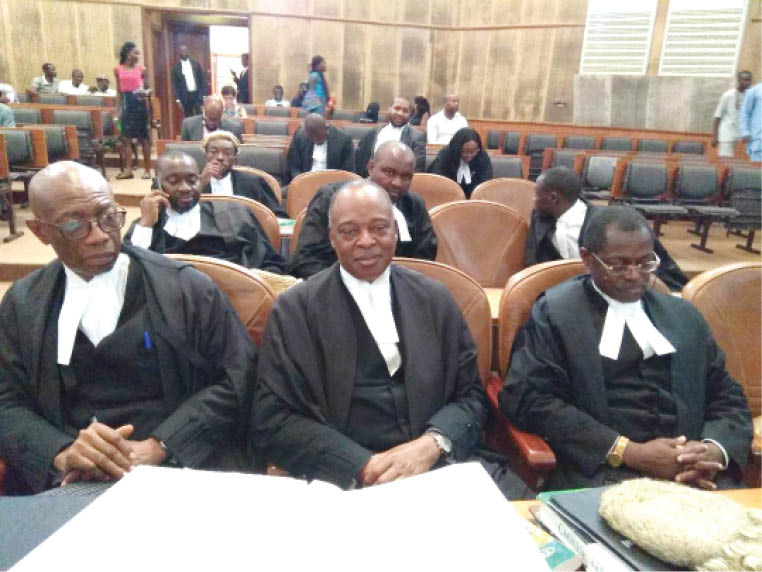Presidential Election Petitions Tribunal 2019: To be or not to be
In a couple of days, the 21 days’ window opened by the Presidential Elections Petition Tribunal (PEPT) Abuja to anyone who wants to challenge the validity of the election of President Muhammadu Buhari will elapse. The PEPT is the only court with exclusive jurisdiction to entertain disputes arising from the presidential election, it is made […]

L-R: Levi Uzoukwu (SAN), Chris Uche (SAN) and P.A. Akubo (SAN) appearing for PDP presidential candidate, Atiku Abubakar during hearing on the application to compel INEC give access to inspect electoral materials at the Court of Appeal in Abuja on Wednesday.
In a couple of days, the 21 days’ window opened by the Presidential Elections Petition Tribunal (PEPT) Abuja to anyone who wants to challenge the validity of the election of President Muhammadu Buhari will elapse.
The PEPT is the only court with exclusive jurisdiction to entertain disputes arising from the presidential election, it is made up of at least three justices of the Court of Appeal and often has the President of the Court of Appeal (PCA) presiding.
One of the reasons why Buhari’s petition against Goodluck Jonathan’s election was thrown out by the 2011 PEPT was because it was filled on the last day which fell on a Sunday, a public holiday.
In 2015, former President Goodluck Jonathan did not approach the 2015 PEPT even though it was constituted by the President of the Court of Appeal (PCA), Justice Zainab Bulkachuwa.
However, there is the likelihood of a departure from the precedence already established by former President Goodluck Jonathan in 2015 when he not only congratulated Buhari but also decided not to approach the PEPT.
Section 134 of the Electoral Act 2010 says that an election petition shall be filed within 21 days after the date of the declaration of results of the elections.
An election tribunal shall deliver its judgment in writing within 180 days from the date of the filing of the petition.
An appeal from a decision of an election tribunal or court shall be heard and disposed of within 90 days from the date of the delivery of judgment of the tribunal.
The law further provides that the court in all appeals from election tribunals may adopt the practice of first giving its decision and reserving the reasons thereto for the decision to a later date.
A former vice president and candidate of the PDP, Atiku Abubakar, is the major potential challenger in the 2019 PEPT. Already, the ex parte application he filed before the Court of Appeal headquarters in Abuja requesting an order compelling INEC to allow access to inspect electoral materials, was last week granted.
The appellate court presided by Justice Abdul Aboki, however, refused the application by Atiku and PDP to be allowed to scan and conduct forensic analysis of the documents.
Atiku’s lawyers, Levi Uzoukwu (SAN), Chris Uche (SAN) and P.A. Akubo (SAN) had requested access to the Voters Register, the Smart Card Reader Machines, Ballot Papers and other sensitive materials for inspection and scanning.
Uche submitted that based on the time limit for election petitions, the order of the Court of Appeal should include the right to inspect, make copies, scan and conduct forensic analysis of the election materials, including memories of card readers and back end of sites.
Atiku is now in a race against time to conclude the inspection and produce evidence to file the petition for the PEPT within 21 days.
Lawyers are still divided on whether or not Atiku and the PDP should approach the PEPT 2019. An arbitration specialist, Professor Paul Idornigie (SAN) while speaking on the use of Alternative Dispute Resolution (ADR) mechanism in election disputes, noted that it may be difficult to employ ADR in post-election disputes.
According to him, post-election issues are controlled and regulated by the Constitution and the Electoral Act. “So, we cannot do ADR for post- election issues.”
“How does ADR work, especially for arbitration? The parties must agree to arbitrate, unlike litigation where I don’t need your consent to sue you, for ADR, we must agree to mediate and arbitrate. The do-or-die nature of election in this country is worrisome. Ideally, pre-election disputes can be handled by ADR, but from the players I’m seeing on our political field, I do not see them agreeing to arbitration,” Idornigie said.
Some lawyers say that Atiku and PDP should not waste their time and money approaching the PEPT, as it seems that the ruling APC has allegedly taken over the court.
Their position is not unconnected with the announcement (few days to the election) of the suspension of Justice Walter Samuel Nkanu Onnoghen, the Chief Justice of Nigeria (CJN) and his replacement with Justice Tanko Mohammed as acting CJN which was greeted with mixed reactions. Some jurists see this development as high wire politics, saying that the executive was carrying on as if it was the overlord of the other arms of government that has the sole prerogative of the suspension and appointment of a CJN.
However, there are lawyers who believe that Atiku and the PDP should approach the PEPT and have their day in court.
To Atiku’s lawyers, where they decide to go to court, they will have some preliminary considerations to make in planning their action.
These include the relevant laws, the possible parties, the type of remedy available and the statute of limitation.
Meanwhile, legal luminary, Dr. Kayode Ajulo has alleged that PDP’s Atiku Abubakar is not eligible to challenge President Buhari because he is not a Nigerian citizen by birth.
Ajulo reportedly said that with his pending case in court against Atiku Abubakar over his qualification as a Nigerian citizen by birth, Atiku cannot until the determination of his eligibility to contest before he can challenge Buhari’s election.
